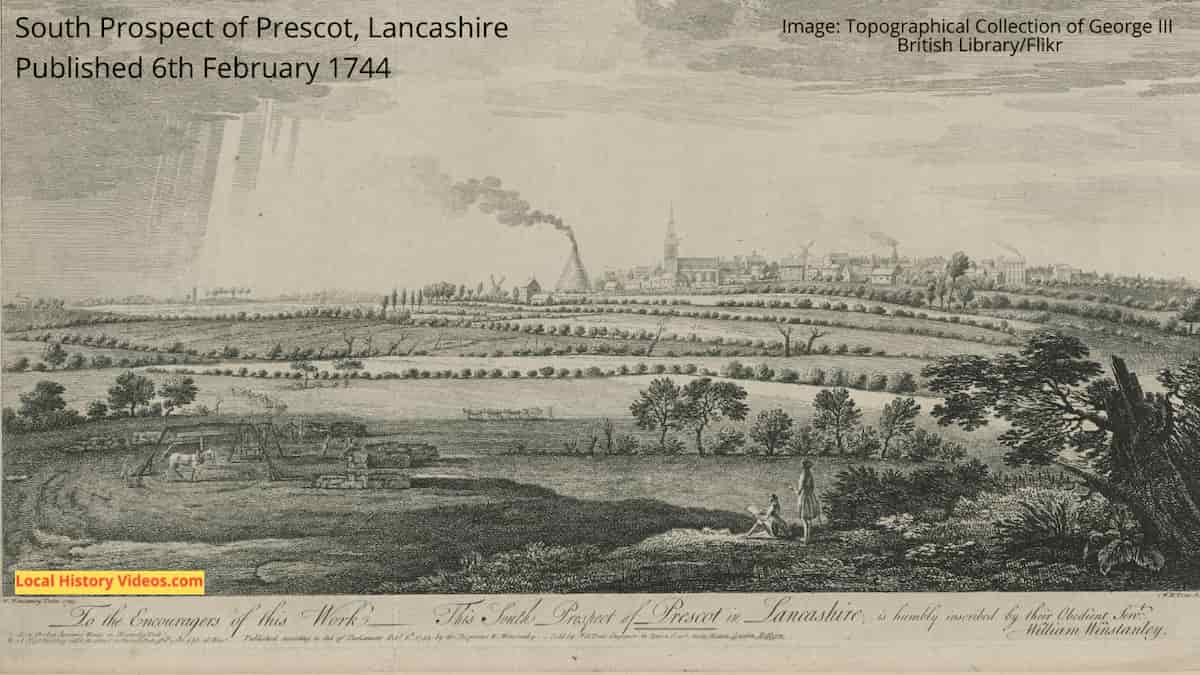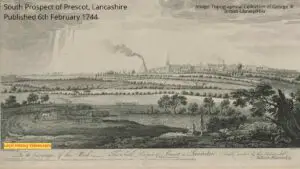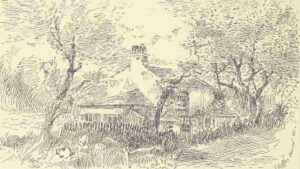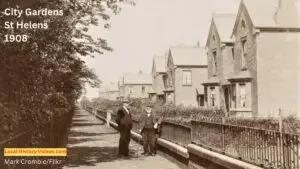Glimpse history through old images of Prescot in Merseyside, which was traditionally in Lancashire, UK.
Brief History of Prescot
The name Prescot is thought to derive from the Anglo-Saxons for priest and cot, meaning the hut or small house owned or occupied by a priest.
In the 14th century, William Dacre, 2nd Baron Dacre obtained a charter for a three-day market and mobile fair in Prescott beginning on the Wednesday after Corpus Christi.
Prescot was home to the Prescot Playhouse, a purpose-built Shakespearean theatre, from the mid-1590s to 1609. The theatre was probably located on Eccleston Street.
The small 16th century town of about 400 inhabitants did not grow much until the early 18th century.
The watch and clock industry was a major employer in the town across the 18th and 19th centuries. This ended with the collapse of his Lancashire Watch Company in 1910.
Traditionally part of Lancashire, Prescot became part of the the Metropolitan Borough of Knowsley in the metropolitan county of Merseyside in the national local government reorganisation of 1974.
In the early 1990s British Insulated Callender’s Cables (BICC) closed its site which had employed 230 local people. The land remained vacant until 2000 when it was transformed into what is now the Cables Retail Park, named after BICC and the site’s history.
In 1630 Richard Halsall was fined for saying the town was governed by fools. You can find other amusing court decisions listed at the end of this page, under the ‘Historic Book’ section.
Stranded in Prescot 1932
This promotional film for BICC in several parts celebrated the effect electricity had made on modern lives and industry.
“It will, also, we believe, relieve the householder of any qualms he or she may have when contemplating the wiring of a house”.
Reel 1 includes some wonderful views of English life almost a century ago. A visit to the electricity shop provides some chuckles, and there’s a demonstration of the cables being made at Prescot’s factory.
Stranded In Prescot British Insulated Cables Ltd Reel 1 (1932) – British Pathé on YouTube
Reel 2 continues the factory tour. At the end the lorries head out of the gates. We can see some terraced houses in the street outside.
Stranded In Prescot British Insulated Cables Ltd Reel 2 (1932) – British Pathé on YouTube
Reel 3 shows the Huyton Quarry factory a few miles along from Prescot, and the Helsby factory near Warrington.
Reel 4 shows the electricity cables being fitted in Stratford upon Avon.
Reel 5 shows the erection of a steel pylon for the Central Scottish Grid Scheme.
Police Medals 1937
In 1937, Lord Derby presented coronation medals to a large number of men, and one woman, employed by the Lancashire Police. Lord Derby was the Lord-Lieutenant of Lancashire.
Prescot Lord Derby (1937) – British Pathé on YouTube
Prescot’s Streets in 1989
This home video filmed by Albert Jones on 5th July 1989 shows the BICC factory from a number of different viewpoints, before moving to nearby streets.
There’s a roadsign to the factory gates, the railway tracks, housing and businesses, a school, the ‘modern’ telephone box, a number of passing and parked cars, and the occasional pedestrian or bus queue.
This video, like the majority on this site, is embedded from YouTube. That means when you press play it will play from the YouTube channel who uploaded the film, and helps their engagement and play statistics, which in turn means YouTube will encourage others to watch it.
Prescot 1989 – Philip Ferguson Jones on YouTube
Old Photos of Whiston Hospital
This video showcases a collection of old photos of Whiston Hospital between the 1880s and 2010, with most of them dating between the 1970s and 1992.
Each image is carefully labelled to show the date and location, and sometimes the name of the staff members shown. It includes the parts of the buildings which had been in use in the site’s previous existence as Prescot Workhouse.
Whiston Hospital Prescot Merseyside – Paul Yates on YouTube
Historic Book
Extract from “The History of the County Palatine and Duchy of Lancaster – Volume 5“, by Edward Baines, William Robert Whatton, Brooke Herford, and James Croston.
Published in 1893
Pages 10-11
The town and township of Prescot has a Roman Catholic chapel, built in 1856 (Vicarage Place). There is, in addition, the Roman Catholic chapel of our Lady Help of Christians, at Portico, near Eccleston Park, a plain brick building, erected in 1790.
By the addition of a new wing since 1876 the presbytery has been transformed into a temporary abode for the Tertianship of the exiled German Jesuits.
There are also chapels for Congregationalists, Unitarians, Wesleyans, and
Primitive Methodists, and a Free Gospel chapel.
Fairs are held at Prescot on the Saturday preceding Corpus Christi and All Saints’ Day. A fortnightly fair for cattle, which is well attended, is held from Shrove Tuesday until old May Day, May 12. There are no other fairs now held at Prescot, though Ash Wednesday, 24th and 25th August, and the 21st October are often named as fair days. The ancient fair, for which William Dacre obtained a charter, is now disused. The market days are Tuesday and Saturday.
The manor and liberty of Prescot was formerly governed by a steward, the “four – men,” a coroner, and several constables. Two of the four-men were nominated by the jury of the court leet and baron, which was composed of twenty-four of the principal inhabitants of the township of Prescot as representing the copyholders, and two were nominated by the steward as representing the provost, fellows, and scholars of King’s College, the lords of the manor.
The town is now governed by a Local Board, the members of which meet on the first Wednesday in each month. A court-baron, or court of requests, used to be held for causes to any amount every fortnight in the Town Hall, which was erected in 1765, and in which the records of the town are preserved.
Prescot, however, is now in the county court district of St. Helens, where the county court is held once a fortnight. There is a general court-baron held annually on Corpus Christi by the steward.
The copyholders of the manor have several important privileges confirmed to them by ancient custom, the most important being exemption from service on any assize or session jury, or any other jury sitting beyond the boundary of the manor.
They are also exempt from all market fees for produce taken into the city of Liverpool.
The neighbouring magistrates hold petty sessions on the first and third Tuesday in every month in the court-house, Derby Street, Prescot, and every Wednesday at Widnes.
A small circular building, surrounded by an arcade, was erected in the centre of the market-place in 1811, at a cost of £429 15s. 10d., for a prison or lock-up, but was pulled down in 1859, and a market-hall erected on the site.
A Public Lending Library was established someyears ago at the suggestion and under the auspices of the late Earl of Derby, which is now incorporated with the Reading and Recreation Rooms.
The Prescot Reporter (proprietors, Messrs. Culshaw, Brown, and Culshaw) is published weekly on Friday evenings for Saturday mornings.
The Prescot Poor-Law Union comprises the following townships: Bold, Cronton, Ditton, Eccleston, Hale, Halewood, Huyton, Knowsley, Parr, Prescot, Rainford, Rainhill, Roby, Speke, Sutton, Thingwall (hamlet), Torbock, Whiston, Widnes, Windle, Much Woolton, Little Woolton.
Total area, 55,592 statute acres.
Population in 1861, 73,127; in 1881, 117,960, showing an increase in twenty years of over 61 per cent.
Some of the customs of the manor of Prescot, contained in a MS. entitled ” An Abstract of the Proceedings in Prescot Court, commencing anno 1509, and ending 1716,” exhibit curious illustrations of the manners of the people of former days:
1534 Ordered , that every man that assaulteth another shall forfeit 3s. 4d., and if blood be drawn, 6s. 8d. more.
[It appears that about this period four men of the town were invested with authority somewhat similar to that of churchwardens or Select Vestry. They are first mentioned in the following item, and afterwards very frequently referred to]
1536. That the inhabitants make their middensteads by the direction of the four men of the town.
(It appears that at this period no stranger was permitted to settle in Prescot without the consent of the inhabitants.]
1541. That no person be permitted to inhabit in the town without the copy holders’ consent, and to bring six sureties.
1512. That ale shall be sold at twopence per gallon the best, and three halfpence per gallon for the second sort.
1554. Divers presentments against men that keep women of evil carriage. Cicely
Hitchmough, formerly presented to be a woman of evil carriage, and to be expelled the town, referred to my Lord to be punished.
1565. Orders for several to leave the town who have abused their neighbours.
1566. That George Saddler is a common drunkard. That the wife of George Saddler is a thief or petty filcher.
1570. An order that young fellows who fight, and who have no money to pay their amercements, shall sit in the stocks three days and three nights; and if any relieve them, to sit in the stocks in their room.
1583. Catherine Dempater banished the town, being of evil government.
1599. Ordered, that no person shall fell or carry away any timber or poles out of Prescot Wood without the consent of the four men on pain of 6s. 8d.
[No vestige of this wood now remains, but there are some fields to the west of the town, called ” The Wood,” and it is conjectured by the editor of the Liverpool Mercury, to whom we are indebted for these amusing extracts, that the ancient wood occupied these fields].
The following items are amongst the most unaccountable of the whole collection :
1607. An order against putting butter on ( in ) bread or cakes on forfeiture of five shillings per time. An order for ale to be sold at one penny per quart out of doors.
1609. An order that the constables pump (on) Alice Allerton, alias Miller, so often as she comes into the streets to chide or abase herself.
1613. Mr. Walban presented for felling eighty trees in Prescot Wood, fined 28s a-piece £8.
1621. A large presentment made by the fourmen concerning several abuses in the wood.
1630. Richard Halsall presented for saying the town was governed by fools, 3s, 4d. Item, for saying he would fell timber in spite of all the town, 3s 4d.
1633. An order for banishing out of the town a woman called Pretty Peggy.
1672. Several presented for bringing corn to the market better at the top of the sack than at the bottom.
1683 . One presented for taking bread without license.
1696. Mr. Parr, for tussling with Esq. Cross, and Esq. Cross for tussling with him again.
The last entry is dated 1716, and to it is appended this memorandum: “And here the Abstract Book breaks off, and takes no further notice of any presentiments , orders , &c. “





